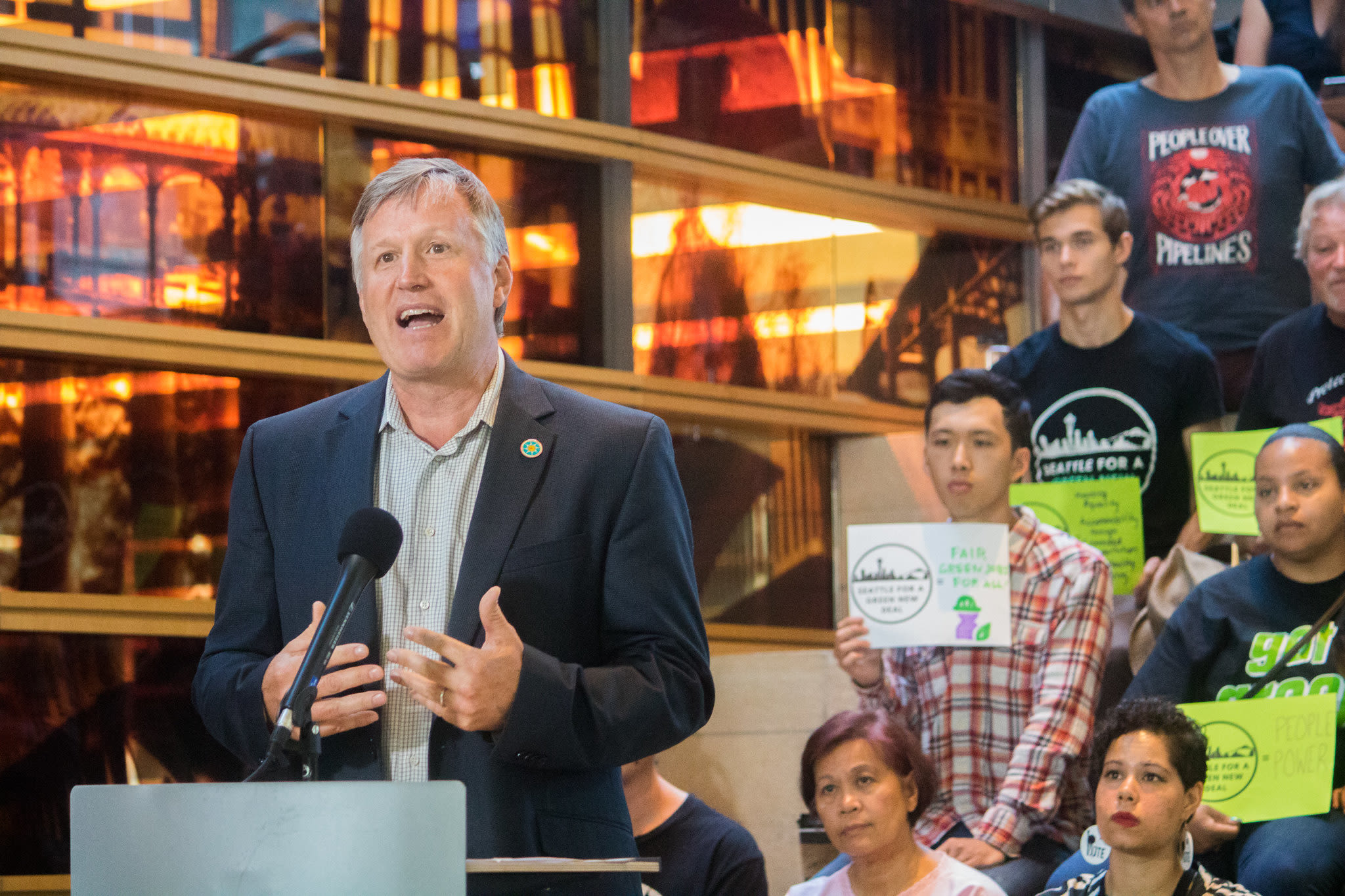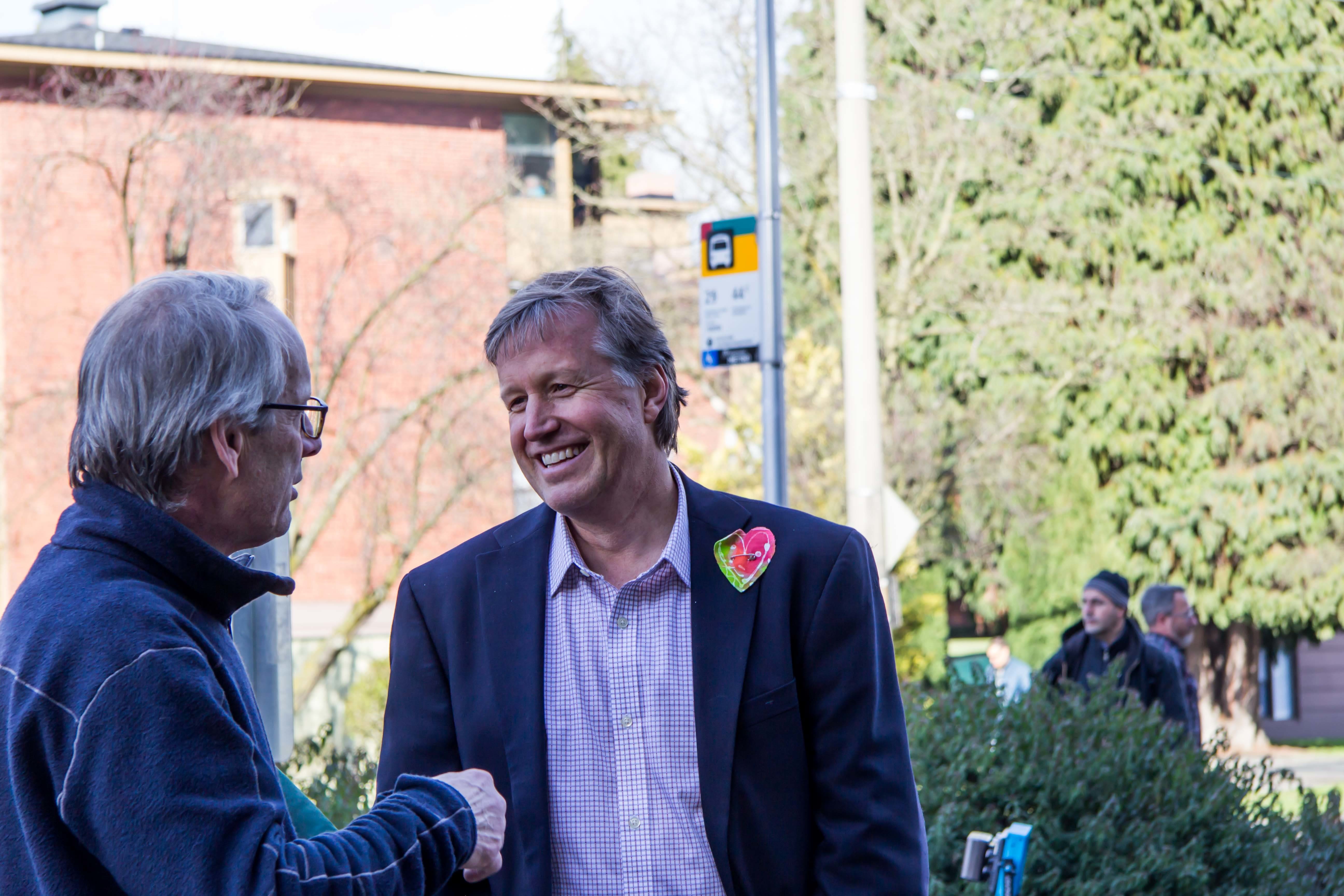City Hall
Council Puts off Driving-Reduction Goals to 2011
Acting on recommendations from the city's Department of Planning and Development and Office of Sustainability and the Environment, the city council rejected a proposal today that would have amended the city's comprehensive plan, committing the city to reducing the number of vehicle-miles traveled in the city 50 percent by 2050.

The amendment, proposed for the second year in a row by open-government activist and Chris Leman (any citizen can propose a comp plan amendment) and supported by many in the environmental community, would have mandated that the city reduce vehicle miles traveled (a widely accepted measure of how much people are driving, and thus how much pollution they're creating), would have mandated an 18 percent reduction by 2020, 30 percent by 2035, and 50 percent by 2050—the same reduction levels adopted by the state last year.
"The largest single contributor to global warming... is the skyrocketing increase in vehicle miles traveled," Leman told the council. "You could simply adopt this amendment today ... and yet you are taking a very hidebound recommendation from the Department of Planning and Development not to do that. That's very short-sighted."
However, council members—particularly planning committee chair Sally Clark—called the proposal premature, noting that DPD and OSE have done virtually no work on developing driving-reduction goals since Leman and others first broached the idea two years ago. "This was discussed [two years ago] and the proper action wasn't taken at the time," said council member Mike O'Brien, a former Sierra Club activist. "If DPD does not deliver [this year], the council has a responsibility to push forward with a VMT goal no later than next year." To that end, DPD and OSE are in the process of hiring a consultant to come up with hard numbers the council can use to adopt a VMT goal next year.
Contacted after the meeting, Clark called Leman's amendment a "last-minute" proposal that might not make sense for Seattle. "We don’t know that the state used the right method in adopting its targets, and I’m not sure they’re the right targets for Seattle" Clark said, noting that Seattle has more drivers—and thus contributes more greenhouse gases—than other parts of the state. Then there's the question of which drivers should count—just trips within Seattle? Trips originating here but not people driving in from other areas? Freight trucks traveling from Everett to Portland?
O'Brien told me he wanted to make sure the council didn't adopt the kind of lofty, unattainable goals state legislator Mary Margaret Haugen recently called "aspirational," without "actually doing any research or doing any thoughtful analysis. ... Just sticking that language in there would be largely symbolic at this point."
Both O'Brien and Clark placed part of the blame for the stalled amendments on the administration of former mayor Greg Nickels, who focused more on committing other cities to greenhouse-gas reduction targets and improving the energy efficiency of buildings than on reducing car trips. "I don't think it's fair [to blame DPD]," Clark said, but "I don't have a sense that this was a big priority for the Nickels team."
Neither DPD nor OSE has returned calls for comment on how they intend to develop a plan to reduce driving in the city.

The amendment, proposed for the second year in a row by open-government activist and Chris Leman (any citizen can propose a comp plan amendment) and supported by many in the environmental community, would have mandated that the city reduce vehicle miles traveled (a widely accepted measure of how much people are driving, and thus how much pollution they're creating), would have mandated an 18 percent reduction by 2020, 30 percent by 2035, and 50 percent by 2050—the same reduction levels adopted by the state last year.
"The largest single contributor to global warming... is the skyrocketing increase in vehicle miles traveled," Leman told the council. "You could simply adopt this amendment today ... and yet you are taking a very hidebound recommendation from the Department of Planning and Development not to do that. That's very short-sighted."
However, council members—particularly planning committee chair Sally Clark—called the proposal premature, noting that DPD and OSE have done virtually no work on developing driving-reduction goals since Leman and others first broached the idea two years ago. "This was discussed [two years ago] and the proper action wasn't taken at the time," said council member Mike O'Brien, a former Sierra Club activist. "If DPD does not deliver [this year], the council has a responsibility to push forward with a VMT goal no later than next year." To that end, DPD and OSE are in the process of hiring a consultant to come up with hard numbers the council can use to adopt a VMT goal next year.
Contacted after the meeting, Clark called Leman's amendment a "last-minute" proposal that might not make sense for Seattle. "We don’t know that the state used the right method in adopting its targets, and I’m not sure they’re the right targets for Seattle" Clark said, noting that Seattle has more drivers—and thus contributes more greenhouse gases—than other parts of the state. Then there's the question of which drivers should count—just trips within Seattle? Trips originating here but not people driving in from other areas? Freight trucks traveling from Everett to Portland?
O'Brien told me he wanted to make sure the council didn't adopt the kind of lofty, unattainable goals state legislator Mary Margaret Haugen recently called "aspirational," without "actually doing any research or doing any thoughtful analysis. ... Just sticking that language in there would be largely symbolic at this point."
Both O'Brien and Clark placed part of the blame for the stalled amendments on the administration of former mayor Greg Nickels, who focused more on committing other cities to greenhouse-gas reduction targets and improving the energy efficiency of buildings than on reducing car trips. "I don't think it's fair [to blame DPD]," Clark said, but "I don't have a sense that this was a big priority for the Nickels team."
Neither DPD nor OSE has returned calls for comment on how they intend to develop a plan to reduce driving in the city.
Filed under
Share
Show Comments




